
VIVARIUM-AN INTERNATIONAL JOURNAL FOR THE PHILOSOPHY AND INTELLECTUAL LIFE OF THE MIDDLE AGES AND RENAISSANCE
Scope & Guideline
Bridging Eras: Unraveling the Philosophical Tapestry of History
Introduction
Aims and Scopes
- Medieval Philosophy and Theology:
The journal prominently features studies on key figures and schools of thought in medieval philosophy and theology, including works by Thomas Aquinas, John Wyclif, and Roger Bacon. It examines their contributions to metaphysics, ethics, and epistemology. - Textual Editions and Critical Analyses:
A significant aspect of the journal's scope is the publication of critical editions of lesser-known texts and commentaries. This includes both textual analysis and the contextualization of philosophical arguments within their historical frameworks. - Interdisciplinary Approaches:
The journal encourages interdisciplinary research that bridges philosophy with other fields such as science, literature, and theology. It often highlights the interaction between philosophical ideas and the scientific advancements of the time. - Historical Contextualization:
Papers frequently explore the socio-political and cultural contexts that influenced philosophical thought during the Middle Ages and Renaissance, providing insights into how these factors shaped intellectual developments.
Trending and Emerging
- Causation and Final Causes:
Recent publications increasingly explore the concept of causation, especially final causation, in medieval philosophy, indicating a resurgence of interest in how these ideas influenced later philosophical developments. - The Interplay of Philosophy and Science:
There is a growing emphasis on the relationship between scientific inquiry and philosophical thought during the Middle Ages, particularly regarding the works of figures like Roger Bacon, showcasing the relevance of philosophical perspectives to the development of scientific methodology. - The Role of Women in Medieval Philosophy:
Emerging discussions surrounding the contributions and roles of women in medieval intellectual life are gaining traction, reflecting a broader trend in academia to include diverse perspectives and recognize previously overlooked figures. - Ethics and Moral Philosophy:
There is an increasing focus on ethical theory and moral philosophy within the medieval context, highlighting how these discussions were framed in relation to metaphysics and theology, which is becoming a vital area of inquiry.
Declining or Waning
- Astrology and Its Philosophical Implications:
The exploration of astrology's role in medieval philosophy appears to be less prominent in recent publications, possibly reflecting a broader trend away from esoteric subjects towards more empirical and rational approaches in medieval studies. - Epicurean Philosophy:
Although previously discussed in the context of medieval thought, the frequency of papers on Epicurus and his influence during the Middle Ages has decreased, indicating a potential shift in focus towards other philosophical influences that have been more central to the period. - Detailed Analyses of Medieval Logic:
Analyses focusing on specific logical frameworks, such as the intricacies of medieval logic, have seen a decline. This may suggest a move towards broader thematic studies rather than detailed examinations of logical systems.
Similar Journals
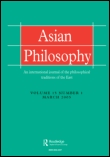
ASIAN PHILOSOPHY
Cultivating Scholarly Engagement in Asian Philosophical TraditionsASIAN PHILOSOPHY is a distinguished journal published by Routledge Journals, Taylor & Francis Ltd, specializing in the rigorous exploration of philosophical thought and traditions rooted in Asian contexts. With an ISSN of 0955-2367 and an E-ISSN of 1469-2961, this journal has established a prominent place in academia, evidenced by its Q2 ranking in Philosophy and Q1 ranking in Religious Studies for 2023. With a focus on advancing the understanding of Asian philosophical traditions and their contemporary relevance, it appeals to researchers, professionals, and students alike. The journal's commitment to quality is reflected in its impressive Scopus rankings, placing it in the 83rd percentile for Religious Studies and the 71st percentile for Philosophy. Although it currently does not offer Open Access, ASIAN PHILOSOPHY continues to provide invaluable insights and foster dialogue on key philosophical issues, making it an essential resource for those interested in the intersections of philosophy and culture. Converging scholarly dialogue from 1991 to 2024, it remains a critical platform for innovative research and interdisciplinary engagement in the field. Contact information is available at their UK address: 2-4 Park Square, Milton Park, Abingdon OX14 4RN, Oxon, England.
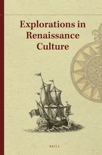
Explorations in Renaissance Culture
Illuminating the Richness of Renaissance CultureExplorations in Renaissance Culture, published by BRILL, is a pivotal academic journal that delves into the multifaceted aspects of Renaissance studies, encompassing Cultural Studies, History, Literature and Literary Theory, Music, Philosophy, and the Visual Arts. Established in 1976 and operating without an open access model, the journal has evolved as a critical platform for scholars and enthusiasts alike, providing rigorous analysis and innovative perspectives on the cultural currents of the Renaissance era. With an ISSN of 0098-2474 and an E-ISSN of 2352-6963, it has garnered a respectable standing among academic peers, evidenced by its quartile ranking in the Q4 category across multiple fields as of 2023 and its Scopus rankings, which acknowledge its role within the broader arts and humanities disciplines. Based in the Netherlands, the journal plays a vital role in fostering scholarly dialogue and advancing research, making it an essential resource for researchers, professionals, and students committed to expanding their understanding of this transformative period in history.

Themata-Revista de Filosofia
Bridging Perspectives in Contemporary PhilosophyThemata-Revista de Filosofia is an esteemed academic journal published by UNIV SEVILLA, EDITORIAL, dedicated to the exploration and dissemination of philosophical thought and inquiry. With a commitment to Open Access since 2008, it provides researchers, professionals, and students free access to high-quality, peer-reviewed articles that contribute significantly to the global discourse in philosophy. The journal aims to foster intellectual dialogue and engagement by presenting diverse perspectives across various philosophical disciplines, making it an essential resource for scholars seeking to deepen their understanding of philosophical issues. The ISSN 0212-8365 and E-ISSN 2253-900X ensure wide dissemination and accessibility, positioning Themata as a vital component of contemporary philosophical literature. Located in Seville, Spain, the journal also emphasizes its role in promoting philosophical studies within the European academic community.
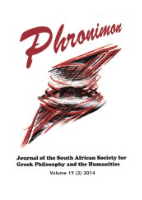
Phronimon
Exploring the Depths of Greek Thought and HumanitiesPhronimon is a distinguished journal dedicated to the exploration and publication of contemporary issues in Greek philosophy and the humanities. Published by the South African Society for Greek Philosophy & Humanities, this journal serves as a vital platform for scholars aimed at advancing knowledge and fostering scholarly dialogue in these fields. With an ISSN of 1561-4018 and an E-ISSN of 2413-3086, Phronimon seeks to enhance the understanding of philosophical traditions and their implications on modern thought. Though currently not open access, the journal is committed to excellence in research dissemination, thereby attracting contributions from leading academics and emerging voices alike. By focusing on interdisciplinary methods and a broad scope that includes ethics, metaphysics, and the intersection of philosophy with cultural studies, Phronimon plays a crucial role in promoting intellectual growth and fostering critical inquiry, making it a valuable resource for researchers, professionals, and students engaged in the humanities.

Revue de Synthese
Navigating the Intersections of ThoughtRevue de Synthèse, published by BRILL, is a distinguished journal in the field of Philosophy, recognized for its rich academic tradition since its inception in 1950. With an impressive history of converged years and a steady commitment to philosophical discourse, the journal offers a platform for scholars to present innovative ideas and critical analyses. Although currently listed in Q4 of the 2023 category quartiles, it serves as an essential resource for those pursuing interdisciplinary studies, enriching the philosophical landscape amidst global intellectual challenges. The journal is not currently available as Open Access, making its curated content accessible through institutional subscriptions. With an ISSN of 0035-1776 and E-ISSN of 1955-2343, Revue de Synthèse aims to empower researchers, professionals, and students alike with transformative insights that advance the understanding of contemporary philosophical issues.

History of Philosophy & Logical Analysis
Illuminating the Intersection of Logic and PhilosophyHistory of Philosophy & Logical Analysis, published by BRILL, is an esteemed journal dedicated to the exploration and critical examination of philosophical thought and its logical structures. With an ISSN of 2666-4283 and an E-ISSN of 2666-4275, this journal serves as a vital platform for scholars in the fields of philosophy and the history of science. Based in the Netherlands, at Plantijnstraat 2, P O Box 9000, 2300 PA Leiden, Netherlands, the journal operates without open access, ensuring a curated selection of high-quality research outputs. Recognized for its scholarly impact, it holds a Q3 ranking in *History and Philosophy of Science* and a Q2 ranking in *Philosophy* as of 2023. Covering a broad spectrum of topics related to logical analysis and philosophical inquiry, the journal aims to connect contemporary philosophical debates with historical perspectives. It supports researchers, professionals, and students alike in their quest for knowledge and understanding within these critical domains.

Erudition and the Republic of Letters
Charting the Evolution of Knowledge Through TimeErudition and the Republic of Letters is a distinguished academic journal published by BRILL that focuses on the interdisciplinary fields of communication, education, history, and philosophy, among others. With an ISSN of 2405-5050 and an E-ISSN of 2405-5069, this journal facilitates scholarly discourse on the intricacies of human knowledge and its dissemination from 2016 to 2024. Despite its classification in Q4 quartiles across several categories, the journal is ranked in the 69th percentile in Arts and Humanities - History, demonstrating its rising significance in the academic landscape. While not an open-access journal, it nonetheless serves as a vital resource for researchers and professionals seeking to explore the historical context and evolution of intellectual thought. Based in the Netherlands at PLANTIJNSTRAAT 2, P O BOX 9000, 2300 PA LEIDEN, this journal is an essential platform for those examining the interplay between literature, linguistics, and the philosophy of science, captivating students and scholars alike with its insightful contributions to the humanities.

Revista Chilena de Estudios Medievales
Illuminating the Past: Open Access to Medieval ResearchRevista Chilena de Estudios Medievales, published by Universidad Gabriela Mistral, is a premier open access journal that has been serving the field of medieval studies since 2012. With its unique ISSN 0719-2215 and E-ISSN 0719-689X, this journal provides a vital platform for scholars, researchers, and students interested in the rich tapestry of medieval history, literature, and culture. Located in Santiago, Chile, at Ladislao Errazuriz 2073, Providencia, Santiago 00000, the journal aims to foster a deeper understanding of the medieval period through interdisciplinary research and insightful articles. While impact factors and HIndex data are currently unavailable, the journal is dedicated to maintaining high academic standards and promoting knowledge dissemination in the field. Its open access model ensures that research is freely available to the global community, thereby enhancing engagement and collaboration among medieval studies scholars. Join us in exploring the depths of the medieval world through Revista Chilena de Estudios Medievales.
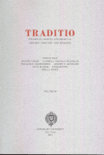
TRADITIO-STUDIES IN ANCIENT AND MEDIEVAL HISTORY THOUGHT AND RELIGION
Advancing Knowledge in Ancient and Medieval ScholarshipTRADITIO - Studies in Ancient and Medieval History, Thought and Religion is a distinguished academic journal published by Cambridge University Press, dedicated to the exploration and analysis of historical, philosophical, and religious narratives from ancient and medieval periods. The journal's ISSN is 0362-1529 and its E-ISSN is 2166-5508. Renowned for its rigorous scholarship, it enjoys a notable standing in the academic community, reflected in its 2023 category quartiles which place it in the second and third tiers across critical fields such as Literature and Literary Theory, Philosophy, Religious Studies, and Visual Arts and Performing Arts. With its comprehensive scope that encompasses multidisciplinary approaches, TRADITIO provides an essential platform for researchers, academics, and students alike to engage deeply with the complexities of historical thought and cultural practices. Although the journal operates within the traditional subscription model, its significance is underscored by impressive Scopus rankings, indicating its high visibility and impact within the arts and humanities sectors. We invite you to discover the richness of ancient and medieval studies through the pages of TRADITIO.
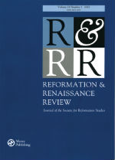
REFORMATION & RENAISSANCE REVIEW
Where History Meets Faith: A Scholarly JourneyREFORMATION & RENAISSANCE REVIEW is a distinguished journal published by Routledge Journals, Taylor & Francis Ltd, focusing on the rich and transformative periods of the Reformation and Renaissance. With an ISSN of 1462-2459 and an E-ISSN of 1743-1727, this journal provides a platform for scholarly discourse that examines the religious, cultural, and historical dimensions of these pivotal eras. Ranked in the fourth quartile (Q4) in Religious Studies, the journal plays a significant role in advancing our understanding of these fields, as indicated by its Scopus rank of #312 out of 644 in Arts and Humanities. Researchers, professionals, and students alike benefit from its rigorously peer-reviewed articles and insightful analyses. While currently not offering Open Access, the journal remains a vital resource for those exploring the complex interplay of faith and culture in early modern Europe. With a publication span from 2013 to 2024, this journal is committed to fostering scholarly excellence and encouraging innovative research that addresses contemporary debates within the disciplines of religious studies and history.